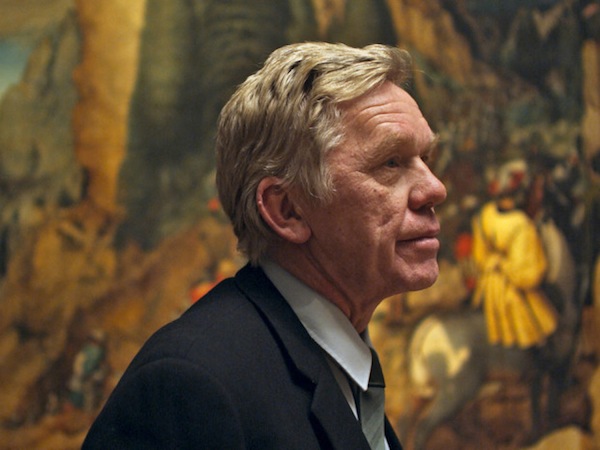You have no items in your cart. Want to get some nice things?
Go shoppingJem Cohen’s quiet and contemplative film explores individuality, the subjective experience and the idle mind.
New York-based director Jem Cohen is best known for his documentaries and visual art often containing candid urban environments with leanings toward the radical and obscure. His latest film, Museum Hours, set in the ashen pallor of a Viennese winter, is a quiet and contemplative drama that explores individuality, the subjective experience and the idle mind.
Johann, a museum attendant, seizes the opportunity to strike up a friendship with Anne, a Canadian visitor who travels to Vienna in support of her distant cousin who is hospitalised and in a coma. Like Johann, Anne lives a solitary life and an unfulfilled one. Cohen’s film allows the audience to observe the temporary moments of companionship between these two and enjoy fragments of their lives told through their eyes.
One of the real delights of this film is the representation of a role where time is not precious. As a museum attendant Johann is invisible to many, he sits or stands for the majority of his time behind the gallery ropes disconnected from the hundreds of people who visit the museum, and excluded from the potential interactions that these bring. Johann’s movements are measured, his voice slow but his mind is permanently active, and it lives out all kinds of realities deeply affected by the paintings that surround him. He imagines the visitors nude, women’s glances, and we see it all too – with him we search the faces of strangers, we desire to learn their stories, to know what they are thinking and to see the world through another’s eyes.
Anne’s experience recalls a solo journey in a foreign place, the contrast of one’s silence against the noise of the city, with her only connection being her comatose cousin who is unable to interact – her cousin is as static and as unattainable as the characters of the paintings that Johann fantasises about daily.
Johann is particularly captivated by the wondrous paintings of Pieter Bruegel, whose busy and animated pictures depict whole villages at play, at worship or at war. Here Cohen deftly connects these paintings with the characters’ lives, and indeed that of the film. In one scene, with Johann looking on, a guide gives her account of Bruegel’s paintings and asks how accurate that depiction is, she concludes that it is the painter looking over his subjects, mixing fantasy with reality, creating “hallucinations of the real”.
The film has no perfect picture postcard shots of Vienna, arguably one of the world’s most beautiful cities, instead we see the industrial sprawl on the city’s outskirts, the homeless and the poor in flea markets, and all Vienna’s traditional beauty enveloped by snow and short dark days. We see Cohen’s Vienna, with all of his predilections and biases built in, just as we see Bruegel’s own view of his world when he painted it. It speaks of the value of individual experience and how subjective our “realities” really are.
We learn from Johann that Vienna is meticulously cleaned every spring so that tourists take home the image that the authorities would like them to see. The film lives by its example, looking deeper than this to find the detail, making its own idiosyncratic impression, just as the guide of Bruegel’s paintings does when delivering a speech to the visitors. She ends it by avoiding justification – “there is no reason we all have to share my opinion”. This is the impression that the viewer takes home, that this is the city according to the director and the world according to its characters, just as our worlds are according to us.
About Christo Hall
Christo is Film and Media Editor at Litro Online, co-editor of culture and politics magazine The New Wolf, and freelance journalist. He recently co-edited New Cartography - the winning brief for arts charity IdeasTap's Anthology magazine





